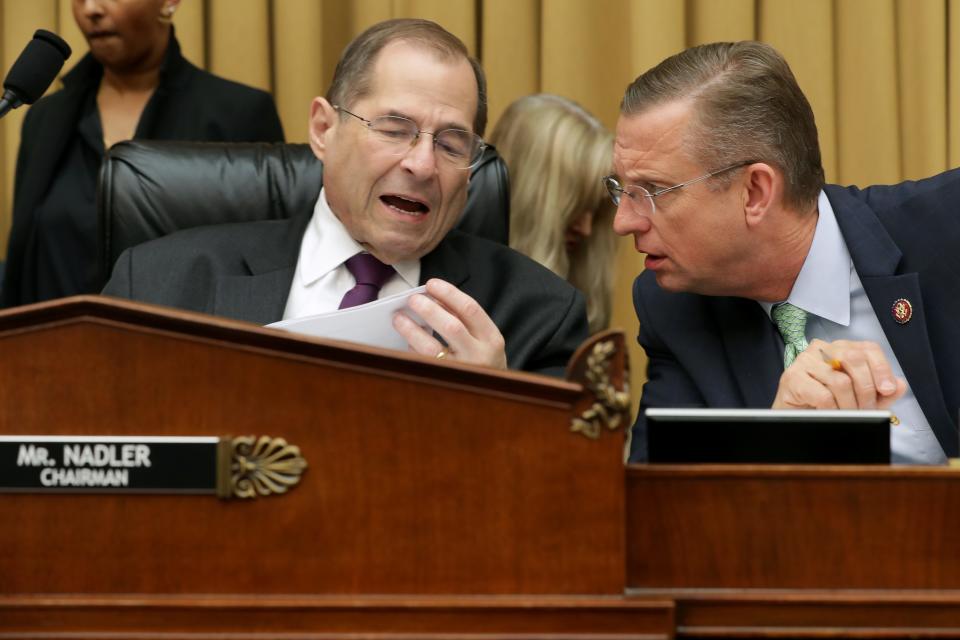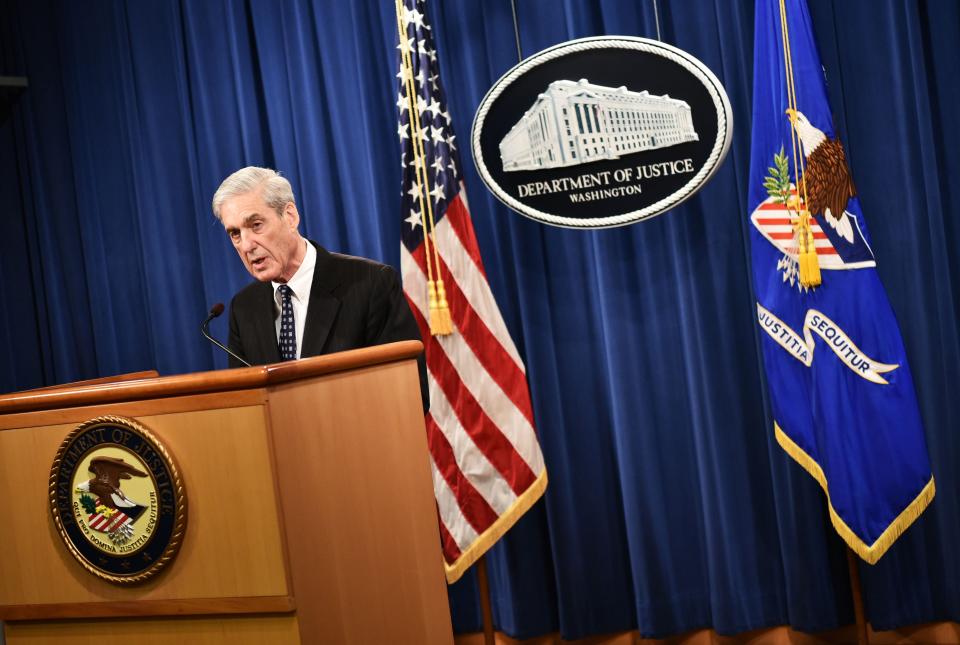Former special counsel Robert Mueller's testimony, like his report, promises an ink-blot test for partisans
WASHINGTON — President Donald Trump and his Republican allies in Congress have spent more than two years questioning the basis of the investigation derided as a witch hunt into Russian interference in the 2016 election.
Republicans complained that special counsel Robert Mueller's team included lawyers who had donated to Democratic candidates, and that part of the FBI's initial probe drew on opposition research paid for by Democrats. And Republicans railed against two FBI officials who exchanged text messages deriding Trump as "loathsome" and an "idiot."
What they have not done – so far – is confront the man they and Trump say was the head of the investigation they derided as a witch hunt. On Wednesday, they will join House Democrats on the Judiciary and Intelligence committees for their first, and likely only, opportunity to grill Mueller about what he found and what he didn't.
Mueller delivered a report in March revealing a sustained effort by Russian agents to sway the 2016 election in Trump's favor and a campaign that appeared to welcome the effort, though it did not find that the two sides conspired. But the political implications of that report have turned into a type of Washington ink-blot test, with Republicans claiming it cleared Trump of wrongdoing and Democrats claiming it showed clear Russian influence and presidential efforts at obstruction.
Mueller's public testimony seems likely to offer more of the same.
“It's a little like the Bible. You can find a quote in there that suits whatever you want to do," said Patrick Cotter, a former assistant U.S. attorney in the Eastern District of New York now in private practice in Chicago. "You can justify slavery, war and murder, and then you can also find quotes that say everybody is equal, don’t murder people, don’t commit war."

Mueller himself has said if summoned, he wouldn’t testify beyond what is included in the report.
“I would not provide information beyond that which is already public in any appearance before Congress,” Mueller said May 29 in his only public statement about the investigation.
Attorney General William Barr told The Associated Press this month that Democrats forcing Mueller’s testimony were trying to create a “public spectacle.”
"I'm not sure what purpose is served by dragging him up there and trying to grill him," Barr said.
Yet everybody wants to get something out of the rare public appearance by Mueller, the famously taciturn former FBI director who for nearly two years supervised the investigation that became Washington's central political drama. Democrats want to highlight damning parts of the report that showcased hundreds of contacts between Trump campaign aides and Russians during the campaign, Russian efforts to influence the election in favor of Trump and then Trump's efforts to thwart the investigation.
Judiciary Chairman Jerrold Nadler, D-N.Y., has noted that Trump refused to be interviewed by Mueller, his associates destroyed evidence and there was substantial evidence that Trump sought to prevent an investigation of his own behavior.
That is why the committee asked Mueller to testify, “so we can get answers to some of these critical questions, because we clearly can’t believe what Attorney General Barr tells us,” Nadler said.
Intelligence Chairman Adam Schiff, D-Calif., has said Congress needs to know more about counterintelligence aspects of the investigation because Trump could be compromised by foreign influence over projects such as his real-estate plans in Moscow.
“Here is what we know: The president sought to make money from a foreign power during his campaign. So did some of his children. So did his campaign manager and his deputy campaign manager. So did his personal lawyer. And his national security adviser," Schiff said in opening a June hearing on the report. "Some of these actors have been prosecuted. But all of their actions are deeply compromising of our national security."

But Republicans want to highlight what they have described as partisan bias in how the investigation began and was conducted.
“I think that the Republican aim might be to sow some confusion about why this investigation got under way and the possibility that it was motivated by Democrats who had an agenda already to try to discredit Trump," said Thomas Alan Schwartz, professor of history and political science at Vanderbilt University. “The whole thrust of their questions will be about the notion that this is politically motivated."
Rep. Jim Jordan, R-Ohio, has said he has a lot of questions about how Mueller spent an estimated $35 million to find no conspiracy between Russians and Trump’s campaign. And Jordan wants to know when Mueller determined there was no collusion during his 22-month investigation, “and why didn’t he tell us?”
Rep. Matt Gaetz, R-Fla., said the key questions will be about “potential pollutants” that led to “oceans of bias” in the inquiry through investigators who had a history of contributing to Democrats.
“I tend to think that the more productive endeavor is to figure out why in the heck the president was falsely accused for two years," Gaetz said of political opposition research polluted by Russians making its way to the upper levels of government. "How did all of that function as a basis to divide and distract us?"
Republicans are also expected to highlight the lack of charges against Trump. Mueller's office said in its report that it could not establish a conspiracy between Russian agents and the Trump campaign, and declined to draw a conclusion on whether the president had committed criminal obstruction. Rep. John Ratcliffe, R-Texas, has said he could ask Mueller 10 times in 10 languages whether there was collusion between the Trump campaign and Russia, "but we already know the answer to that question."
The top Republican on the Judiciary Committee, Rep. Doug Collins of Georgia, has said he has been asking the panel to invite Mueller ever since the special counsel's redacted report was delivered to Congress.
“While the special counsel found that no Americans conspired with Russia to attempt to interfere in our elections, many have willfully misrepresented that conclusion while Democrats have neglected their responsibility to safeguard future elections from foreign influence,” Collins said.
Because the interpretations of the special counsel's conclusions have been so divided, reaction to the hearing could be, too. Cotter, the former prosecutor, said the hearing could resemble a ping-pong match, where questions are lobbed back and forth across the witness table. Indeed, Mueller's 448-page report appeared to offer ammunition for everyone.
Cotter said one “money quote” for Republicans on page 9 of Volume 1, which says that “while the investigation identified numerous links between individuals with ties to the Russian government and individuals associated with the Trump Campaign, the evidence was not sufficient to support criminal charges.”
But Democrats could point to the next paragraph, which says “the investigation established that several individuals affiliated with the Trump Campaign lied to the Office, and to Congress, about their interactions with Russian-affiliated individuals and related matters.”

Another exchange could deal with whether Russians got Trump’s former campaign chairman, Paul Manafort to change the Republican Party platform to dilute providing assistance to Ukraine. Republicans could point to page 10 of Volume 1 to have Mueller say “the investigation did not establish” such efforts “were undertaken at the behest of candidate Trump or Russia.”
But two paragraphs later, Democrats could note that the report says “some fo the individuals we interviewed or whose conduct we investigated – including some associated with the Trump Campaign – deleted relevant communications or communicated during the relevant period using applications that feature encryption.”
Another conflict is possible over the June 9, 2016, meeting between campaign officials and Russians at Trump Tower. Republicans could point to page 106 of Volume 2 to say Trump did nothing to prevent emails or other information about the meeting from being given to Congress or the special counsel. But Democrats could point to passages describing Trump trying to prevent public release of the emails or misleading reporters about the meeting.
On the question of whether Trump obstructed justice during the course of the investigation, Republicans have highlighted that “the evidence does not establish that the President was involved in an underlying crime related to Russian election interference,” from page 157 of Volume 2.
But Democrats could cite actions Trump took to protect the legitimacy of his election, including firing former FBI Director Jim Comey, trying to remove Mueller and suggesting possible pardons for witnesses.
“I just think it’s going to be incredibly frustrating for everybody, including the American public,” Cotter said. “I don’t think it’s frankly going to do much.”
More on special counsel Robert Mueller and the Russia inquiry:
Robert Mueller, in first public remarks, says charging Trump was 'not an option we could consider'
'Case closed': Senate Majority Leader Mitch McConnell declares Robert Mueller's Russia probe over
This article originally appeared on USA TODAY: Robert Mueller testimony: Republicans eager to quiz special counsel

